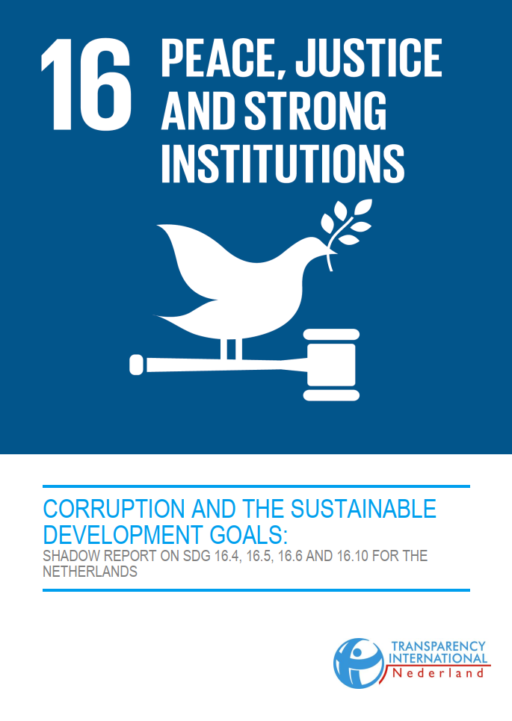The Netherlands: Progress Towards Sustainable Development Goal 16
Description
This Sustainable Development Goals (SDGs) parallel report offers an independent review of the government-led 'National Voluntary Review' (NVR) SDG process in the Netherlands. Produced for the occasion of the United Nations High-Level Political Forum (HLPF) meeting in New York in July 2018, this assessment provides an independent account of the progress towards SDG 16 in the Netherlands.
The report provides independent analysis to complement and scrutinise official government progress reports related to SDG targets that focus directly on corruption. It provides a comprehensive picture of national anti-corruption progress across a range of policy areas. More specifically, targets 16.4 (illicit financial and arms flows), 16.5 (reduce bribery and other forms of corruption), 16.6 (transparent and accountable institutions) and 16.10 (access to information) are analysed in depth. The report includes a set of 12 policy recommendations to improve the situation in Netherlands in terms of corruption.
Contents
- Introduction
- Scorecard
- Major Findings
- Recommendations
- National progress made towards SDG targets 16.4, 16.5, 16.6 and 16.10
Major Findings
Target 16.4: By 2030 significantly reduce illicit financial and arms flows, strengthen recovery and return of stolen assets, and combat all forms of organized crime
The Netherlands scores just above average on target 16.4 with 51%. The different policy areas assessed under this target are anti-money laundering (75%), beneficial ownership (25%) and asset recovery(42%). The Netherlands scores particularly poor on beneficial ownership transparency as the country is still awaiting for the adoption of the Act on Ultimate Beneficial Ownership (UBO) and the implementation of the resulting UBO-register. The bill is currently under consideration by the Senateand the expectations are that the UBO-register will be implemented in March 2020.
Target 16.5: Substantially reduce corruption and bribery in all their forms
The highest score on the SDG-targets is given to target 16.5 with 62%. This target looks into the following different policy areas: anti-corruption framework and institutions (81%), private sector(75%), transparency in lobbying (0%) and transparency in party and election campaign finance (50%). Most noticeable is the score of 0% for transparency in lobbying. This can be explained by the fact that the Netherlands lacks an official law or policy setting a framework for lobbyists and lobbying activities. For example, there is no statutory code of conduct for lobbyists, the Netherlands only holds a voluntary lobby register containing a minor percentage of the total amount of lobbyist present in the country and has no independent authority that monitors lobby activities. Even though lobbying is generally seen as an integral part of the political model ( in the Netherlands, the countries’ legislation demonstrates a clear need to enhance regulations in this area.
Target 16.6: Develop effective, accountable and transparent institutions at all levels
The different policy areas assessed under this target are transparency and integrity in public administration (24%), fiscal transparency (75%), integrity in public procurement (44%) and whistleblowing (43%). The Netherlands scores particularly poor on transparency and integrity in public administration. The low score is predominantly caused by a lack of sanctions and/or oversight bodies enforcing Codes of Conducts formembers of the Dutch Public Administration. Furthermore, the low score regarding the transparency of Dutch public administration is related to a lack of regulations and oversight addressing the ‘revolving door’ between the public and private sector.
Target 16.10: Ensure public access to information and protect fundamental freedoms, in accordance with national legislation and international agreements
The Netherlands scores below average on target 16.4 with 44%. This target looks into the policy area of access to information. The below-average score can be explained by the fact that there areconsiderable restrictions on the right of access to information under the freedom of information act. The timelines for responding to a request are relatively long. Although anyone may apply for a request
on information, there many exceptions to the right of access and therefore many possibilities for the requests to be denied on several grounds. Furthermore, an independent oversight for non-complianceon the right to access of information is lacking.
Authors
Research leads: Serv Wiemers & Lotte Rooijendijk
Researcher and author: Kaz Van de Voort
Expert review: Tessa Kits & Paul Vlaanderen
Input from: Ep Hannema (Norton Rose) and Maarten Visser (Free Press Unlimited)
Date
20/02/2020
Tags
 Download PDF
Download PDF
